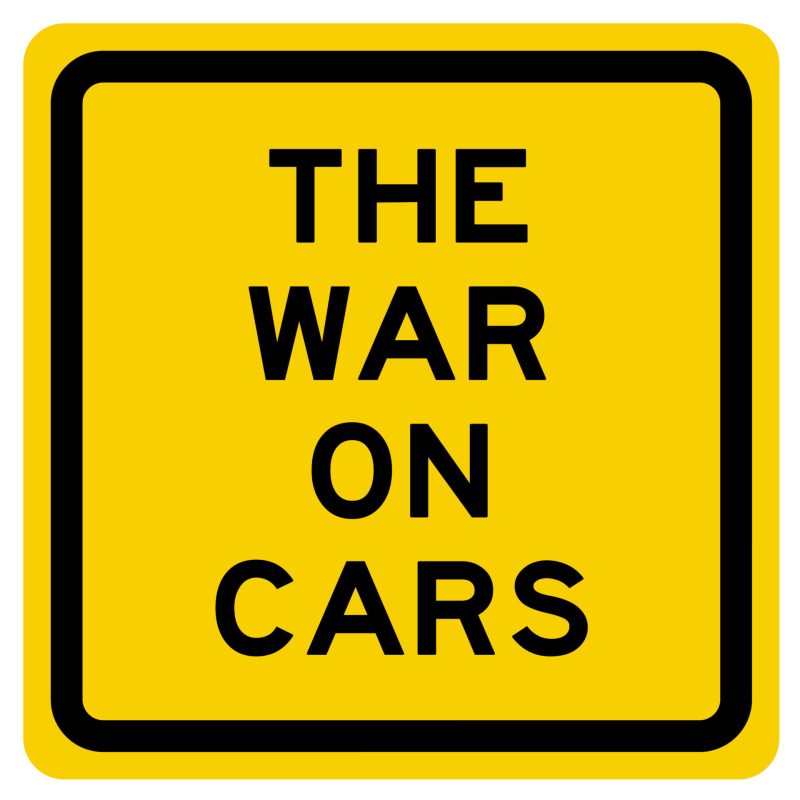Commentary: Is Denver Ready for The War on Cars?

This guest commentary is by Doug Gordon, a Brooklyn-based safe-streets advocate, writer and TV producer. He, journalist Sarah Goodyear, and Streetsblog founding editor Aaron Naparstek co-host The War on Cars, available wherever you get your podcasts. The War on Cars will record its first episode with a live audience on Monday, Feb. 10 in Denver at Bicycle Colorado’s Moving People Forward conference.
Is there really a war on cars?
In cities across North America, any effort to make streets safer and more accessible for people not behind the wheel of a motor vehicle is often interpreted as being tantamount to a “war on cars.” Taking so much as a single car parking spot and using that space to park twelve bicycles or create an expanded bus stop tends to send motorists — and the politicians who depend on their votes — into a state of apoplexy. In that way, the so-called “war on cars” is a bit like such media-driven controversies as “the war on Christmas” or “the war on men.” It’s a slight readjustment of the status quo to create a more inclusive future that, to those who aren’t used to having their primacy in society questioned, feels like a threat.
The truth is that if there is any sort of war on America’s streets, it is being inflicted on other road users by cars and the people who drive them. Last year, 71 people died on Denver’s roads, more than in 2018. Many of the victims were pedestrians and cyclists. This despite Denver having joined the ranks of American cities pursuing Vision Zero, a plan to eliminate all traffic deaths and serious injuries. In that sense, redesigning the system so that people don’t die needlessly as they go about their daily lives shouldn’t be seen as a war on cars, but rather as a righting, however slight, of a historic wrong.
Recognizing the many changes being experienced by cities like Denver as well as in our own backyard of New York City, we launched our podcast in 2018, taking the often-heard criticism against making streets safer and embracing it as our title: The War on Cars. Now, after nearly 40 episodes, we’re proud to bring the show to Denver to Bicycle Colorado’s Moving People Forward conference on Monday, February 10 for our first episode with a live audience.
Part of the vision for The War on Cars is to take much of the discussion surrounding cars out of the world of statistics, urban planning, and drive-time radio traffic reports and place it into the much larger context of U.S. politics and culture. On the podcast, we sometimes refer to auto-dominance, the state in which all people find themselves surrounded by and exposed to cars even if they do not – or cannot – drive. From the ways in which cars occupy nearly every inch of our public space and dictate the design of our communities and the quantity and quality of our social interactions to the ubiquitous nature of automobile advertising and the ways in which we all participate in a system which kills nearly 40,000 Americans each year and is cooking our planet, it’s like we’re all fish in a vast sea of automobiles, never noticing the pollution- and congestion-choked water in which we swim.
Thankfully, things are starting to change, especially here in Denver. A growing coalition of government officials, business leaders, community activists, and concerned urban residents are beginning to coalesce around the idea that our car-dominated status quo must be challenged. Denver’s recently announced plan to add 125 miles of bicycle lanes by 2023 was the result of these partnerships. While it is undeniable that driving will continue to be a necessity for many Coloradans for the foreseeable future, it is encouraging to see Denver move toward a place where owning and operating an automobile becomes less of a requirement for full participation in civic life.
Even the recent closure of Denver B-Cycle could be interpreted as a sign of hope. A bicycle-sharing program that was once new, unproven, and somewhat controversial when it launched in 2010 was just last week lamented by many as a terrible loss to the city. While its demise has left some disappointed – not to mention stranded – there are now a host of new mobility options poised to take its place, from e-bikes to scooters.
Another bright spot is a new generation of journalists who are willing to speak truth to (automotive) power. One of them will be our podcast guest on Monday, Kyle Clark. Kyle, who many of you know from his perch as the host of Next with Kyle Clark on 9News, brings a fresh perspective on the changes to Denver’s urban landscape. Kyle first caught our attention when he took a small group of Denver residents to task for opposing a bike lane on historic preservation grounds. “You don’t own the street in front of your home,” said Kyle in a pointed on-air editorial. “We, the public, own the street in front of your home,” he continued. “Our streets belong to everyone, so everyone can get from here to there with as little fear of being killed as possible.” It was a clear and calm plea for sanity, safety, and equity that hopefully broke the discussion about who and what streets are for out of the sometimes-limited world of advocacy and into the public sphere.
That discussion is something we hope to continue with Kyle and our live audience as we enlist more Denverites into The War on Cars.
Get Streetsblog Denver’s weekday headlines delivered to your inbox. Sign up for our e-mail digest.
Support Streetsblog Denver. Give $5 per month.


